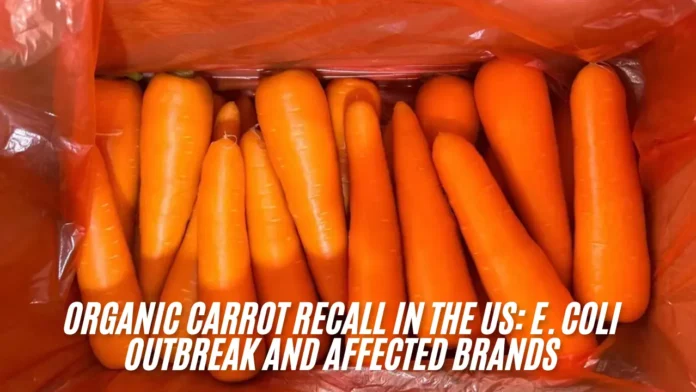Organic Carrot Recall in US Linked to Popular Brands Over Deadly E-Coli Outbreak
Organic carrot recall by popular brands in the US has left people worried due to a fatal E. coli outbreak that has now spread to several states. At least one person has been reported dead, while over 30 patients are hospitalized, as health officials issue public warnings and carry out massive product withdrawal at supermarket chains nationwide. If you purchased organic carrots, you should be aware of the contaminated products and should take adequate measures to protect your health.
What Was the Organic Carrot Recall?
Organic Carrot Recall : In October 2024, the Centers for Disease Control and Prevention (CDC) issued an alert across the country about an E. coli O121 outbreak in relation to organic and baby carrots sold in large markets. This E. coli strain, which can cause serious illness, especially in vulnerable populations, has led to at least 39 reported cases across 18 states, with one fatality confirmed. Most of the infected individuals have come from states like New York, Minnesota, and Washington, while California and Oregon rank next.
The carrots come from Grimmway Farms and are sold under several brands: Trader Joe’s, Whole Foods’s 365, Target’s Good & Gather, and Walmart’s Marketside. The bags in question might still be found in the home since they no longer appear on store shelves. In making the announcement of the recall, it was so that customers can inspect their purchases and either dispose of or return the affected carrots for a refund.
Organic Carrot Recall : Affected Products and Brands
Organic Carrot Recall : The recall of organic whole carrots, as well as organic baby carrots, will be applied to the following product lines. Details on each can be found at:
The respective brands for which the products were recalled include the following:
- 365 (Whole Foods): 1 lb, 2 lb, 5 lb
- Bunny Luv: 1 lb, 2 lb, 5 lb, 10 lb, 25 lb
- Cal-Organic: 1 lb, 2 lb, 5 lb, 6 lb, 10 lb, 25 lb
- Compliments: 2 lb
- Full Circle: 1 lb, 2 lb, 5 lb
- Good & Gather (Target): 2 lb
- Marketside (Walmart): 2 lb
- Nature’s Promise: 1 lb, 5 lb
- O-Organics: 1 lb, 2 lb, 5 lb, 10 lb
- Trader Joe’s: 1 lb
- Wegmans: 1 lb, 2 lb, 5 lb
- Wholesome Pantry: 1 lb, 2 lb, 5 lb
Among the recalled are baby carrots under several brands including those of Bunny Luv, Cal-Organic, and Good & Gather. Their best-by dates fall between September 11 through November 12, 2024.
Consumers are advised to check their refrigerators for the items, especially if they purchased carrots within the affected period from August 14 to October 23, 2024, and appropriately dispose of or return them.
Organic Carrot Recall : How E. coli Contaminates Carrots
Organic Carrot Recall : E. coli, or Escherichia coli, is a common bacterium that lives in the intestines of most people and animals. Most E. coli are innocuous; however, some can cause serious and sometimes life-threatening foodborne illness. For example, E. coli O121 can cause severe abdominal cramps, bloody diarrhea, and vomiting. The contaminated organic carrots would normally be grown in soil and possibly contaminated at the time of harvesting, packaging, or handling.
While the bacteria survive inside animals, contamination of produce usually happens through improper handling or irrigation using contaminated water. Here, E. coli might have been transferred from soil or water to the carrots, even though they are typically washed before reaching consumers.
Organic Carrot Recall : E. coli Symptoms and Risk Factors
Symptoms of an E. coli infection usually begin after three to four days, but they can start as soon as two days and as late as eight days from the time of exposure. Most people recover from the disease without needing medical care; however, some individuals are at greater risk for developing a more acute form of kidney failure known as hemolytic uremic syndrome (HUS), and those include most children under the age of 5, the elderly, and people with compromised immune systems.
Organic Carrot Recall – Common Symptoms of E. coli Infection:
- Abdominal pain and cramping
- Diarrhea (which may be bloody)
- Fever
- Nausea and vomiting
- Dehydration, which can cause symptoms such as dry mouth, dizziness, and reduced urination
Such issues can precipitate HUS, leading to symptoms such as easy bruising and pale skin, as well as decreased urine output. If you or any member of your family develop signs of severe illness, such as a very high fever, prolonged diarrhea, or signs of dehydration, you should seek medical care immediately.
Organic Carrot Recall : Precautions and Recommendations
If you just purchased some organic carrots that may have been recalled, do the following to reduce risk exposure:
1. Look at the packaging: Check the name of the brand, the size of the product, and when you purchased it. Then find the recall list.
2. Take the recalled ones out: Don’t eat them. Give the carrots away or return them to the store and get your money back.
3. Sanitize surfaces: Clean and disinfect all surfaces, utensils, and containers that may have contacted the recalled carrots. Wash cleaning supplies in hot soapy water or a dishwasher.
4. Monitor symptoms: If you or someone in your household begins to experience symptoms and signs of E. coli infection, seek medical care right away if you develop pain or tenderness in the abdomen that worsens over a few hours.
The Bottom Line
Therefore, this E. coli outbreak reminds consumers about a killer in the garden of fresh produce, especially organic carrots and other items that come into contact directly with the soil and water. Most people recover from E. coli infection without elaborate medical interventions, but those populations might suffer life-threatening complications, so vigilance and proper food handling become a much-needed aspect.
Therefore, for now, staying updated about the recall is necessary and follow CDC recommendations, and be quick if you have bought some of the affected products because your health is the primary concern, and fast response can help eliminate this bad bacterium from spreading widely.
> Social Security Fairness Act: What It Means for Retirees and What Happens Next


